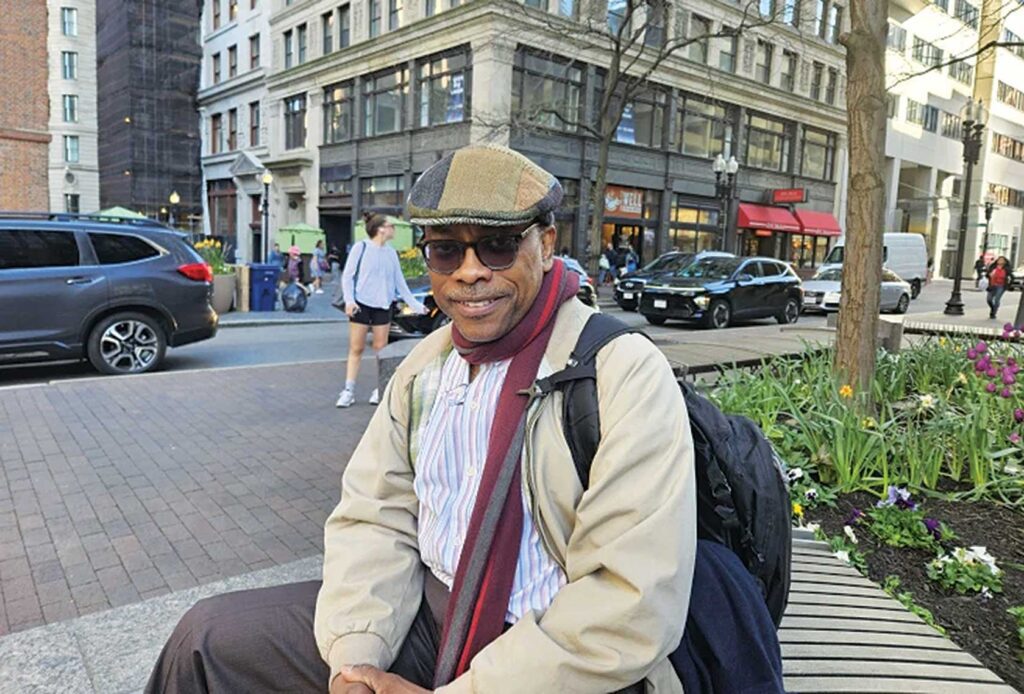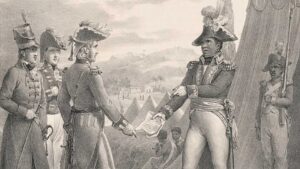Groundbreaking in Boston for Haitian cultural center
Named for Haitian revolutionary hero Toussaint L’Ouverture

The Old State House in downtown Boston is a monument to revolution, hidden in plain sight. Commuters, tourists and street vendors hustle past the 18th century former Massachusetts capitol site of the Boston Massacre and Boston’s first reading of the Declaration of Independence. Sitting just across the street from it on a recent afternoon, Charlot Lucien, founder of the Haitian Artists Assembly of Massachusetts, had the author of a different revolution on his mind. Toussaint L’Ouverture was one of the major leaders of the Haitian Revolution. Lucien compares him to two American greats: Frederick Douglass and Abraham Lincoln.
“Of course, I could have named a few abolitionists as well, but the weight of the historical mission that Lincoln had to take on his shoulders, to me, is comparable to what Toussaint L’Ouverture had to deal with,” he said.
A groundbreaking ceremony for the Toussaint L’Ouverture Cultural Center of Massachusetts took place on Monday near TD Garden. The center will act as a gathering place and resource for local Haitians. And organizers hope it will also help the legacy of one of history’s great leaders live on.

Toussaint L’Ouverture was one of the major leaders of the Haitian Revolution. IMAGE: LIBRARY OF CONGRESS PRINTS AND PHOTOGRAPHS DIVISION WASHINGTON, D.C.
L’Ouverture is believed to have been born enslaved in the former French colony of Saint-Domingue, which would become Haiti upon its independence. He was a military leader and statesmen who made key contributions to abolition. The constitution of 1801, which was written under L’Ouverture’s guidance, banned slavery.
His leadership helped the former French colony chart a path to independence and paved the way for the world’s only successful revolt by enslaved people.
Régine Michelle Jean-Charles, the director of Africana Studies at Northeastern, compares
L’Ouverture to another revered American.
“Just thinking about the impact and the reverence and the extent to which he is seen as really a freedom fighter, I think that that is very appropriate to compare him to Harriet Tubman,” she said.
L’Ouverture, like many of history’s most famous figures, has been built into a larger-than-life figure. But Jean-Charles stresses that L’Ouverture didn’t view himself as solely responsible for freeing Haiti.
“We’re very much about the collective, the collaborative, the understanding that ‘L’Union fait la Force,’ as it says on the Haitian flag, which is, ‘There’s strength in unity,’” she said.
“So, his recognition of the collective, I think, is something that we can also learn from and to me also links him to contemporary abolition struggles.”
L’Ouverture’s legacy across Boston
When the Toussaint L’Ouverture Cultural Center, or TLCC opens, it will serve as a hub for the local Haitian community and beyond.
The facility, which has been a long time in the making, will act as a conference center, hosting meetings, lectures and workshops. Its library will house Haitian literature, among other works. And it will serve as a space for hosting functions ranging from festivals to weddings.
But L’Ouverture’s modern legacy in Boston isn’t limited to the new cultural center.
In 2017, Boston Public Schools opened The Toussaint L’Ouverture Academy, the first two-way immersion Haitian Creole dual-language preschool program in the country. And he even got a shout out in Black Panther: Wakanda Forever as the namesake of T’Challa’s son.
Nancy Accime, a member of the TLCC’s executive committee, believes the center will tie in directly to L’Ouverture’s mission.
“This provides the opportunity to really highlight … what he stood for. The ideals,” Accime said.
“Which I think is in alignment with most people in terms of making sure that you have liberty, making sure that you have these freedoms.”
Although L’Overture was one of the architects of the Caribbean nation, he never actually got to see a free Haiti. The French captured him in 1802 and he died the following year. Haiti would officially declare independence in 1804.
Back outside the Old State House, about a 20-minute walk from where the Toussaint
L’Ouverture Cultural Center will break ground later this month, Charlot Lucien reflected on how Boston has been a historic hub of support for Haiti. President John Adams, who was from
Massachusetts, actually sent U.S. foreign aid to L’Ouverture.
“So it makes sense to explore those historical connections and make that we move forward a certain agenda that will cement who we are and that will also contribute to booster Boston’s reputation as a bastion of freedom and abolition,” he said.
Esteban Bustillos is a reporter for GBH News.






